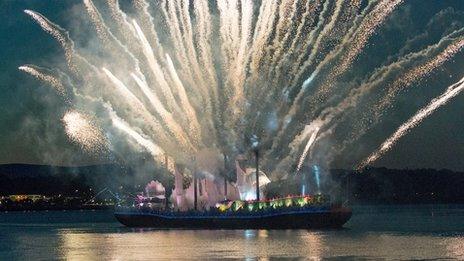What lessons can be learned from UK City of Culture 2013?
- Published

UK City of Culture 2013 has seen spectacle, fun events, disagreement, engagement and frustration
Over the next two days, four cities will make their final pitches to succeed Londonderry as the next UK City of Culture.
Leicester, Hull, Swansea Bay and Dundee are all competing to hold the title in 2017.
Representatives of each of the shortlisted bids have travelled to Derry to hand in their submissions.
The trip is also a chance for the cities to learn lessons from those involved in running 2013's events.
The government set up the UK City of Culture competition after the success of Liverpool's year as European Capital of Culture in 2008.
Those behind Derry's bid happily acknowledge they were "guinea pigs" for the concept, but they say there was no shortage of enthusiasm in the city.
"You could multiply the official programme by about a factor of four," says Sharon O'Connor, chief executive of Derry City Council.
"The community here just came out en masse and started doing events."
The list of shows, exhibitions and concerts held since January 2013 is impressive, and big events have certainly brought attention to the city.
Division
Tens of thousands of people attended BBC Radio One's Big Weekend, while hundreds of thousands travelled to the city for the Irish music festival, the all-Ireland fleadh. It was the first time the event had ever been hosted north of the Irish border.
The Turner Prize, which is taking place in the city, also marked a first. The Turner had never been held outside England before.
However, smaller, fun events have also added to the general sense of celebration. There have been attempts to set world records for the longest Riverdance, the greatest number of Annies and the greatest gathering of brides.
That sense of coming together has been very important in a city where wall murals can still give an impression of sectarian division.
If anything showed the potential for problems it was the name of the bid. It was titled Derry/Londonderry 2013 because of the age-old disagreement about what to call the city.
Getting wide support for events across both unionist and nationalist communities was seen as vital.
"It has done amazingly well - it has brought both sides together," said one woman about Derry's year as City Of Culture.
"It has made the town and community one and it has put us on the map for a change."
However, some had hoped that millions of pounds of funding would have a greater impact on Derry's economy.
It is a city that has suffered in the downturn, having faced long battles with issues like unemployment and deprivation.
"Whilst we had great marketing around City of Culture it has had no impact on jobs," says Conal McFeely of Creggan Enterprises.
"The jobs situation has actually got worse."
Critics have called this a 12-month party for Derry and questioned if enough was done to attract tourists and their cash.
The organisers say that businesses have benefitted.
"We already know that there have been over 75 nationalities represented in the city over the year," said Shona McCarthy, the chief executive of the Culture Company 2013.
"From May right through to September we have broken all previous records for hotel occupancy.
"So that tells me we have got visitors. That tells me people are coming here."
However, on occasions the City of Culture has been in the headlines for the wrong reasons.
There have been artistic frustrations. Rita Duffy, who set up a gallery in an old shirt factory, almost walked away from the project over funding issues.
"It wasn't the most welcoming place," she told BBC Northern Ireland's political programme, The View.
"I had major problems with individuals from Derry City Council. I couldn't get money to the project. In fact, at one stage I was leaving."
She criticised, in particular, the high levels of bureaucracy that existed between the Culture Company and Derry City Council.
The council said that it did deliver on what it set out to achieve.
Nonetheless there have been some very public rows between the two organisations responsible for making 2013 a year to remember.
"I think you need to be very clear from the outset," says Shona McCarthy of the Culture Company.
"If you are going to have an independent company (to run events), have an independent company to do it.
"If it is going to be run by the local council, let it be run by the local council.
"But I think this hybrid model has not really worked."
Even before 2013 has ended, the focus is moving to the future.
All those who have been involved in organising events are now using the word "legacy" and discussing how people can build on what has been achieved.
After a year when funding has been an issue often discussed, that will inevitably lead to many more questions about cash.
But some believe that it is too easy to forget the simple feelgood factor created by Derry's success in becoming the first UK City of Culture.
"I think the legacy of it, is that it has changed Derry," says Mickey Bradley of the Undertones, one of the city's most famous bands.
"There is not another one for another four years, so it is a bit like Brazil winning the World Cup.
"We are the UK City of Culture until 1 January 2017."